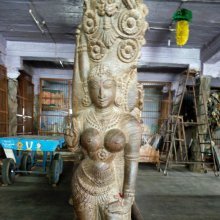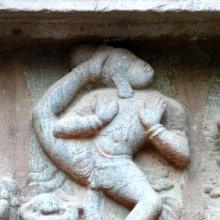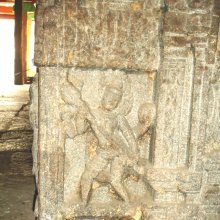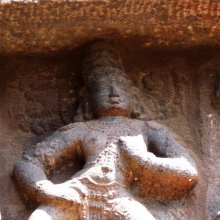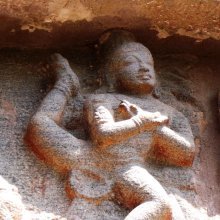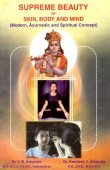Udvartana: 13 definitions
Introduction:
Udvartana means something in Hinduism, Sanskrit. If you want to know the exact meaning, history, etymology or English translation of this term then check out the descriptions on this page. Add your comment or reference to a book if you want to contribute to this summary article.
Images (photo gallery)
(+10 more images available)
In Hinduism
Ayurveda (science of life)
Toxicology (Study and Treatment of poison)
Source: Shodhganga: Kasyapa Samhita—Text on Visha ChikitsaUdvartana (उद्वर्तन) refers to the “rising up (of a snake)” (with the desire to bite) and represents one of the characteristics of the appearance of a snake before biting, as taught in the Kāśyapa Saṃhitā: an ancient Sanskrit text from the Pāñcarātra tradition dealing with both Tantra and Viṣacikitsā—an important topic from Āyurveda which deals with the study of Toxicology (Agadatantra or Sarpavidyā).—The Kāśyapasaṃhitā (verse VI.65) details the appearance of a snake before biting: The sarpas when desirous of biting display certain change of bodily features in their body like—stiffness of the neck, the contraction of the hood, discolourisation and rising up (udvartana) with the desire to bite.
Unclassified Ayurveda definitions
Source: Wisdom Library: Āyurveda and botanyUdvartana (उद्वर्तन) refers to “ointment”, but more specifically, it is a treatment of herbs and oils, used for toning and strengthening the body. It is used throughout Ayurvedic literature such as the Caraka-saṃhitā and the Suśruta-saṃhitā.
Source: archive.org: Vagbhata’s Ashtanga Hridaya Samhita (first 5 chapters)Udvartana (उद्वर्तन) refers to a “massage”, which is mentioned in verse 3.19 and 4.29-31 of the Aṣṭāṅgahṛdayasaṃhitā (Sūtrasthāna) by Vāgbhaṭa.—Accordingly, “[...] Having removed the surplus phlegm by pungent emetics and sternutatories etc., by light and rough food, (and) by gymnastics, massage [viz., udvartana], and treading [...]”.
Note: Udvartana (“massage”) has been paraphrased by lus-kyi mñe-ba (“body massage”). CD read lus phyi-mñes-pa instead (the former with a miscarved pyi), which properly means “wiping and rubbing the body”, phyi(s) and mñes being the perfect stems of ’phyi-ba and mñed-pa combined into a hendiadys action-noun; cf. dril-phyis “rolling and wiping” in 2.14.

Āyurveda (आयुर्वेद, ayurveda) is a branch of Indian science dealing with medicine, herbalism, taxology, anatomy, surgery, alchemy and related topics. Traditional practice of Āyurveda in ancient India dates back to at least the first millenium BC. Literature is commonly written in Sanskrit using various poetic metres.
Natyashastra (theatrics and dramaturgy)
Source: Wisdom Library: Nāṭya-śāstraUdvartana (उद्वर्तन, “springing up”) refers to a specific gesture (āṅgika) made with the thighs (ūru), according to the Nāṭyaśāstra chapter 10. These gestures form a part of the histrionic representation (abhinaya).
Source: archive.org: Natya ShastraUdvartana (उद्वर्तन, “turning very quickly”).—A type of gesture (āṅgika) made with the thighs (ūru);—Instructions: observing Valita (Valana) with force. Uses: in exercising [limbs] and the Class Dance.

Natyashastra (नाट्यशास्त्र, nāṭyaśāstra) refers to both the ancient Indian tradition (shastra) of performing arts, (natya—theatrics, drama, dance, music), as well as the name of a Sanskrit work dealing with these subjects. It also teaches the rules for composing Dramatic plays (nataka), construction and performance of Theater, and Poetic works (kavya).
Purana and Itihasa (epic history)
Source: archive.org: Nilamata Purana: a cultural and literary studyUdvartana (उद्वर्तन) refers to “emollient unguents” as part of the cosmetics and personal decoration that was once commonly applied to one’s body in ancient Kashmir (Kaśmīra) as mentioned in the Nīlamatapurāṇa.—Reference is made in the Nīlamata to various sorts of scents, perfumes, unguents, flowers and garlands. Some processes of decoration like rubbing the body with emollient unguents (udvartana), anointing it with unguents (utsādana) and applying sandle-paste etc. after bath (anulepana) are referred to.

The Purana (पुराण, purāṇas) refers to Sanskrit literature preserving ancient India’s vast cultural history, including historical legends, religious ceremonies, various arts and sciences. The eighteen mahapuranas total over 400,000 shlokas (metrical couplets) and date to at least several centuries BCE.
Languages of India and abroad
Sanskrit dictionary
Source: DDSA: The practical Sanskrit-English dictionaryUdvartana (उद्वर्तन).—
1) Going up, rising.
2) Springing up, growth (of plants, grain &c.)
3) Prosperity, elevation.
4) Turning from side to side; springing up, popping the head; चटुलशफरोद्वर्तनप्रेक्षितानि (caṭulaśapharodvartanaprekṣitāni) Meghadūta 42.
5) Grinding, pounding.
6) Drawing out metal, wire-drawing.
7) Anointing, smearing; करोद्वर्तनार्थे चन्दनं समर्पयामि (karodvartanārthe candanaṃ samarpayāmi); cf. also सायण (sāyaṇa)'s commentary on the Śatapaṭha Brāhmaṇa 12.8.3.16. सर्वसुरभिचन्दनादि उन्मर्दनं उद्वर्तनं यजमानस्य भवति (sarvasurabhicandanādi unmardanaṃ udvartanaṃ yajamānasya bhavati) |
8) Particularly, rubbing and cleaning the body with perfumes or fragrant unguents, or the unguents used for this purpose or to relieve pain; नाक्रामेद्रक्तविण्मूत्रष्ठीवनोद्वर्तनादि च (nākrāmedraktaviṇmūtraṣṭhīvanodvartanādi ca) Y.1.152; Manusmṛti 4.132 (abhya- ṅgamalāpakarṣaṇapiṣṭakādi Kull.). In this connection the meaning 'vomiting' seems appropriate, along with other filthy objects; cf. उद्वृत्त (udvṛtta) = vomited.
9) Bad behaviour or conduct, rudeness.
Derivable forms: udvartanam (उद्वर्तनम्).
Source: Cologne Digital Sanskrit Dictionaries: Benfey Sanskrit-English DictionaryUdvartana (उद्वर्तन).—i. e. ud-vṛt + ana, n. 1. Jumping, [Meghadūta, (ed. Gildemeister.)] 41. 2. What has served for rubbing the body with, [Mānavadharmaśāstra] 4, 132.
Source: Cologne Digital Sanskrit Dictionaries: Cappeller Sanskrit-English DictionaryUdvartana (उद्वर्तन).—[adjective] bursting (tr. —°); [neuter] rising, ascending; rubbing, anointing, unguent.
Source: Cologne Digital Sanskrit Dictionaries: Monier-Williams Sanskrit-English Dictionary1) Udvartana (उद्वर्तन):—[=ud-vartana] [from ud-vṛt] mfn. causing to burst, [Harivaṃśa 9563]
2) [v.s. ...] n. the act of rising, going up, ascending, jumping up, [Meghadūta; Kathāsaritsāgara; Varāha-mihira’s Bṛhat-saṃhitā]
3) [v.s. ...] the springing up of plants or grain etc.
4) [v.s. ...] swelling up, overflowing, [Caraka]
5) [v.s. ...] drawing out metal, laminating, [Horace H. Wilson]
6) [v.s. ...] grinding, pounding
7) [v.s. ...] rubbing or kneading the body, rubbing and cleansing it with fragrant unguents
8) [v.s. ...] the unguents used for that purpose (or to relieve pains in the limbs etc.), [Yājñavalkya; Manu-smṛti; Suśruta; Kathāsaritsāgara] etc.
9) [v.s. ...] bad behaviour, bad conduct, [cf. Lexicographers, esp. such as amarasiṃha, halāyudha, hemacandra, etc.]
[Sanskrit to German]
Sanskrit, also spelled संस्कृतम् (saṃskṛtam), is an ancient language of India commonly seen as the grandmother of the Indo-European language family (even English!). Closely allied with Prakrit and Pali, Sanskrit is more exhaustive in both grammar and terms and has the most extensive collection of literature in the world, greatly surpassing its sister-languages Greek and Latin.
Kannada-English dictionary
Source: Alar: Kannada-English corpusUdvartana (ಉದ್ವರ್ತನ):—
1) [noun] a rising; a going up; a rise.
2) [noun] a springing up; growth (of a plant).
3) [noun] a prosperous condition; good fortune, wealth, success, etc.; prosperity.
4) [noun] to keep from happening; to avoid; to ward off; to fend off.
5) [noun] the act or an instance of anointing perfumes to the body.
6) [noun] a particular type of applying, colour or paint to a picture.
7) [noun] an ointment, unguent used to rub on the body.
8) [noun] any powder used with water for cleaning the body; soap powder; soapnut powder.
9) [noun] bad behaviour, conduct; rudeness.
Kannada is a Dravidian language (as opposed to the Indo-European language family) mainly spoken in the southwestern region of India.
See also (Relevant definitions)
Starts with: Udvartanadravya, Udvartanalaya, Udvartanamgey, Udvartanammadu, Udvartanavidhi.
Ends with: Matsyodvartana, Samudvartana.
Full-text: Apavritti, Udvamana, Utsadana, Matsyodvartana, Uru, Unmardana, Alaktaka, Anjana, Snana.
Relevant text
Search found 6 books and stories containing Udvartana, Ud-vartana; (plurals include: Udvartanas, vartanas). You can also click to the full overview containing English textual excerpts. Below are direct links for the most relevant articles:
Natyashastra (English) (by Bharata-muni)
Charaka Samhita and Sushruta Samhita (by Nayana Sharma)
Hygiene of the body and personal grooming < [Chapter 6]
Atharvaveda and Charaka Samhita (by Laxmi Maji)
4b. Leprosy (Kuṣṭha) in the Caraka-saṃhitā < [Chapter 5 - Diseases and Remedies in Atharvaveda and Caraka-Saṃhitā]
Lord Hayagriva in Sanskrit Literature (by Anindita Adhikari)
Worship (with and without form of image) < [Chapter 6]
Sushruta Samhita, volume 4: Cikitsasthana (by Kaviraj Kunja Lal Bhishagratna)
Chapter XXIX - Elixirs (rasayana) for the prevention of death and decay
The Mahavastu (great story) (by J. J. Jones)
Chapter XXXII - The Kuśa-jātaka < [Volume II]
Related products
